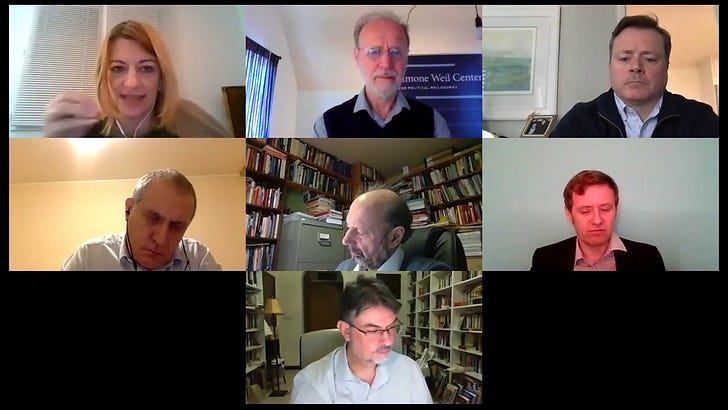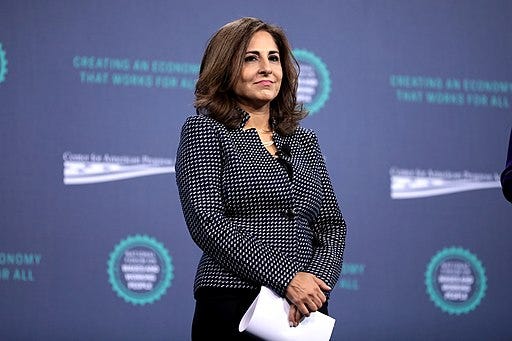WASHINGTON, DECEMBER 7—The Simone Weil Center for Political Philosophy recently hosted a panel discussion on U.S.–Russia relations and Russia’s place in the world. The full video of this exchange, recorded December 2nd, is here:
The discussion was moderated by Anatol Lieven, the distinguished journalist and scholar. The panel was comprised of George Washington University’s Marlene Laurelle, the philosopher and editor Boris Mezhuev, the University of Kent’s Richard Sakwa, the University of Ottawa’s Paul Robinson and myself. Our discussion concerned the political currents currently roiling the U.S. and Russia.
Many speakers touched upon the problem of identity politics, here in the U.S. and as a powerful strand within Russian liberalism. Lieven noted, correctly, that identity politics often amounts “elite contempt veiled as something else.” Indeed, as I have noted elsewhere, American identity politics encourages a “culture war” approach to politics at home but also encourages us to pursue a kind of cultural monism abroad. Over the past summer the U.S. witnessed much political violence in the service of a particular ideology, which, when you think about it, is a good reflection of how the conducts its foreign policy, which does much the same thing in its deployment of violence abroad in the service of its own geopolitical and ideological goals.
In his remarks, Paul Robinson noted that Russian liberals have, like their American counterparts, embraced identity politics, but in so doing, have alienated themselves from the wider Russian public. Doing so, incidentally, plays to Putin’s strengths: The Russian president has long embraced the themes of patriotism, sovereignty and the heroic aspects (relating particularly to the Second World War) of the Soviet past. Robinson observes that the more Russian liberals associate with the West the less chance they have of succeeding.
But Putin’s determination not to disavow the entirety of the Soviet experience is but one of the sources of his hold on power. As Richard Sakwa pointed out, Putin’s ability to navigate among what he described as four main constituencies (the Liberals, the Siloviki (i.e., the military and intelligence agencies), the neo-traditionalists, and the Eurasianists) also helps explain Putin’s longevity and popularity.
What follows is a transcription of my remarks.
Good afternoon.
I’m going to concentrate my prepared comments on that most basic of questions: What does Joe Biden’s election mean for U.S.–Russia relations?
The Biden team is made up, so far anyway, of utterly conventional liberal interventionists: the designees for national security advisor, Jake Sullivan, secretary of state, Antony Blinken, and director of national intelligence, Avril Haines, are well known members of the Washington establishment.
This tells us that we are likely in store for a return to the pre–Trump status quo. The rhetoric likely to be employed by the incoming administration will emphasize the importance of “our allies” of “multilateralism” and of “American global leadership.”
We may even see a move toward, maybe institutionalization, of a kind of “league of democracies” to fend off the alleged advances the much-feared “global authoritarians,” such as Russia’s Putin, India’s Modi, China’s Xi, Hungary’s Orbán, and Poland’s Kaczyński, have made over the past four years with what is often claimed to be the connivance of Donald Trump.
What it also portends is a foreign policy defined by standard-issue liberal hawkishness: I would expect an escalation against Syria, a hard line toward Russia, and a confused, contradictory policy toward China wherein we attempt to re-engage China economically yet at the same time attempt to isolate it diplomatically and militarily. On the upside I predict a cooling off of hostilities with Iran and an attempt to rejoin a number of arms-control treaties that the Trump administration has withdrawn from.
Then there are the appointments that don’t have a direct hand in foreign policy but are still very concerning for the message they send.
First, there is White House press secretary Jen Psaki, who, as State Department spokeswoman under John Kerry, had a reputation for making a number of questionable assertions with regard to the Ukrainian civil war. But the very worst of these is the nomination of the career-long political operative Neera Tanden to head the Office of Management and Budget. Tanden, who has no known qualifications for the position, spent much of the last four years circulating conspiracy theories about how the Russians literally changed the vote count to favor of Trump in 2016.
The think tank Tanden leads, the Center for American Progress, attempted to capitalize on the hysteria that she herself was spreading by forming an online media outlet called The Moscow Project—an odious example of the kind of liberal McCarthyism that seemed to infect every single liberal and mainstream news and opinion outlet for the past four years—without exception.
* * *
I'll wind up by asking you to consider a hypothetical: What if Biden surprises us and proposes a reset in relations, and set up U.S.–Russia commissions similar to those set up during the Clinton and Obama administrations.
I would suggest that even if there is a new reset or some breakthrough in other areas, such as arms control, the problems are going to remain.
Resets can be valuable. I think there was some value in the Obama reset: It certainly facilitated people-to-people exchanges and dialogue between government agencies.
But the problem with resets is that they cannot really succeed when the underlying assumptions of the two countries are diametrically opposed—as they are now.
The key difference revolves around the concept of sovereignty. In the U.S., various administrations have shown that their approach to sovereignty is basically hypocritical, amounting to little more than sovereignty for me, but not for thee.
And so, we get situations where the U.S. is totally unconcerned with whether or not certain countries we have selected for regime change have, under international law, sovereign governments, yet when it comes to signing on to or respecting decisions by the International Criminal Court, for example, the U.S. inevitably takes a different stance.
It isn’t only high government officials in both parties that distain sovereignty.
The abandonment of the foundational idea behind the UN Charter by progressive and liberal policy practitioners and intellectuals can be seen in comments made recently by the darling of the progressive policy community Matt Duss, who currently serves as a foreign policy advisor to Bernie Sanders.
“We see,” said Duss in a recent interview with the DSA–aligned Jacobin, “the sovereignty argument being brought up by the authoritarian right all the time, and especially now… It’s a move away from the idea of universality. I think reviving a commitment to universality is really important.”
Yet anyone with a cursory familiarity with the history of the mid–20th century might evince a touch more skepticism toward universalist political programs.
But I believe that this will be the message that will be coming out of Washington in the coming years: Sovereignty is a tool for global authoritarians, like Putin—it is not something we Americans need be overly concerned about.
And I expect this line of thinking will emerge as a popular rationale for what may become, quite unfortunately, a two-front cold war with Russia and China in the coming years.
Thank you.






Right. A commitment to universality as long as it's OUR universality. That's the problem. My observation is that we always get into trouble when Person/Group/whatever A insists on telling B what they can and can't do and trying to enforce it. The blatant hypocrisy that invariably accompanies only makes it more odious.
I've never understood the US's apparent need to tell other people how to organize their government when we can't even organize our own.